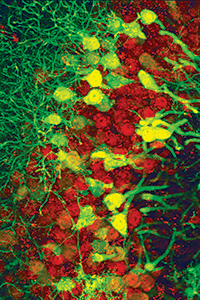How Does Alcohol Change the Brain?
Seeking Answers in the Lab

Buddy Whitman in one of the Breese labs where he spends most of his day examining alcohol's effects on the brain.
It's quite likely that you know someone whose life has been affected by the tragedy of alcoholism. In fact, the National Institutes of Health estimates that more than 17 million Americans suffer from alcohol dependence or abuse. However, researchers today are grappling with the mystery of why certain people are more susceptible to this debilitating dependence on alcohol than others. One Carolina graduate student, Buddy Whitman, is working 24/7, 12 months of the year, on this puzzle.
Whitman is a fourth-year doctoral student in Neurobiology whose research examines the relationship between exposure to alcohol and changes in adolescent brains. He explains, “the primary focus of my research is to look at changes associated with adolescent brains when they have been exposed to alcohol. Previous research on human adolescent drinking has shown that adolescents who drink alcohol are more prone to have drinking problems as adults. But why is that? What changes in their brains might contribute to this? That is the current mystery.” In order to study this phenomenon, he exposes rats to ethanol, and then examines brain tissue from the animals to gauge what changes have occurred.
Although Whitman conducts his research on rats, his work might ultimately have implications for humans. Whitman is of Cherokee descent. He noted that while alcoholism is a universal problem affecting all groups of people it also has had a major impact on the American Indian community. He hopes to help others by contributing to a better understanding of the progression of alcoholism. It is known that with each attempt to quit, withdrawal symptoms worsen, which may be due to changes in the brain. Whitman's work looks for ways to stop this pattern and he's pleased with the potential impact of this research. “It's good to know that I am doing something that's relevant. I like feeling that I'm making a contribution to the bigger picture and that it makes a difference.”

Neurons in the hippocampus of the rat's brain that were exposed to alcohol.
In the first year of the Neurobiology graduate curriculum, students complete work rotations in several labs. For Whitman, one lab was directed by Dr. George Breese, a Professor in the departments of Psychiatry and Pharmacology, as well as the division head for Preclinical Neuropsychopharmacology and the Bowles Center for Alcohol Studies.
In the second year of the program, when students choose which lab they want to work in permanently, Whitman's first choice was the Breese lab. “It really turned out to be a great fit. It provides an exceptional learning experience because it's a top-heavy lab, meaning that there are several research-track professors collaborating with one tenure-track professor. Having had the benefit of as many as seven mentors available at one time has been incredible,” he says. Whitman is the only graduate student working in this lab, and spends about 50 hours there per week. In the neurobiology program, students conduct research year-round.
“Summertime is about the same as any other time of year, since I'm not taking classes anymore. There's no such thing as summer vacation when you're a doctoral student in the lab!” He adds, “by this point in your program, you start thinking about your progress a bit differently. Rather than thinking about how many days until vacation, you think about days until graduation. I enjoy the work that I do, and the goal of graduation keeps me focused.”
Even though neurobiology students—like most students in lab sciences—work year-round and are funded for 12 months, the summer can provide special opportunities. During his first two years of study, Whitman received a research training grant funded by the National Institute on Drug Abuse and the American Psychological Association. As a part of this award, Whitman attended the Summer Program in Neuroscience, Ethics and Survival, a five-week course that exposes students to neuroscience laboratory techniques, contemporary neuroscience research, ethics and graduate school survival skills. Through this program, Whitman made invaluable connections in his field. “It really feels like an extended family. If I have any questions or need help with anything I know that there are people and resources available,” he says.
“Previous research on human adolescent drinking has shown that adolescents who drink alcohol are more prone to have drinking problems as adults. But why is that? What changes in their brains might contribute to this? That is the current mystery.”
Whitman also recently received the National Research Service Award (NRSA) through the National Institute on Alcohol Abuse and Alcoholism, a division of the National Institutes of Health. He is grateful for this fellowship and the accompanying opportunities. “NRSA funding is a fairly prestigious award, and bodes well for one's future. It also offers resources for traveling to conferences so that I can network with others in my field,” he says.
Whitman plans to complete his degree by the end of 2012. After finishing his doctorate, he wants to become a biology professor. His interest in teaching developed when he worked as an AmeriCorps volunteer, serving as an environmental educator at the National Wildlife Refuge. He also worked as a teaching assistant during his master's program at Boise State University, which furthered this interest. He explains, “I enjoy the work that I do in the lab, and I'm looking forward to the potential impact that I could have as an educator. I'm passionate about science, and I'd love to pass that interest and knowledge on to my future students.”
♦ Enelda Butler


